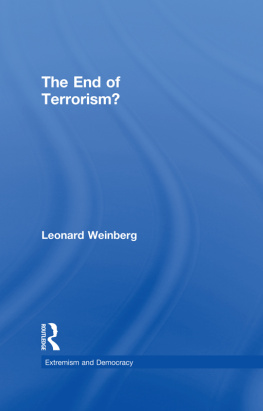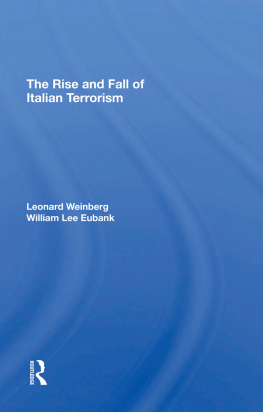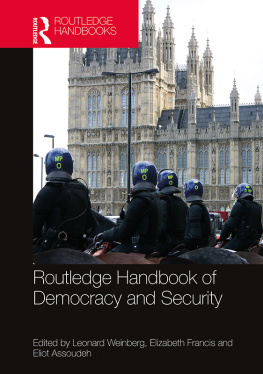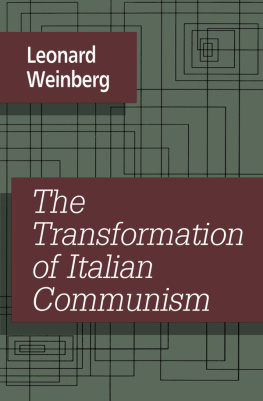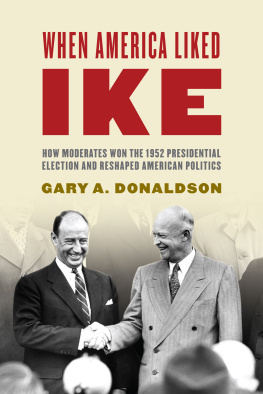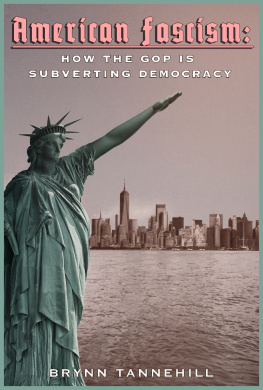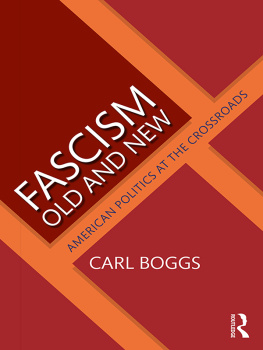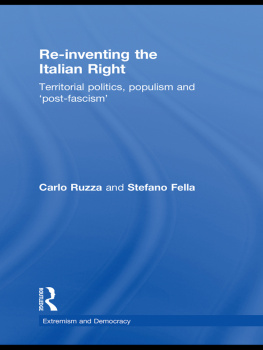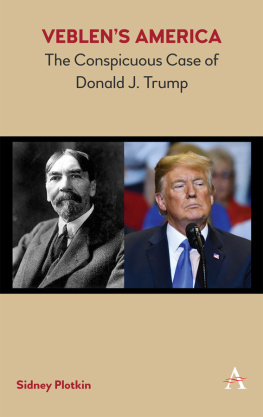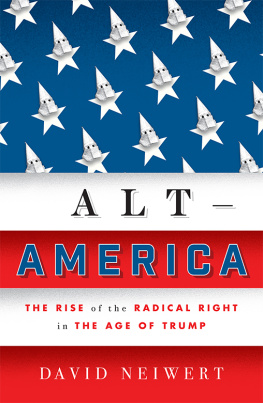In the course of 2016, when the gathering momentum of Trumps presidential campaign of 2016 could no longer be dismissed as a blip, US journalists, celebrities, and self-appointed political pundits started engaging passionately in a protracted debate about the fascist contents and dynamics of his growing popularity. Since most insisted on displaying an almost willful ignorance of both history and political science with respect to the key term fascism, even at the highest level of state politics, it was inevitable that far more heat was generated than light, muddying the waters of discussion and intensifying the general atmosphere of liberal hysteria in ways which probably contributed to Trumps victory rather than impeded it.
Leonard Weinbergs Fascism, Populism and American Democracy finally offers genuine insights and considered analysis to those still eager to understand the complex relationship to actual fascism of the populist movement of support that Trump has whipped up with his rhetoric, rather than join in the public slanging match about it. Highly readable, but profound, the book gives intelligent readers the chance to regain a foothold on the terra firma of Enlightenment values based not on mythic thinking and visceral emotions, but on research-based knowledge and argument, the bedrock of all genuine liberal responses to the repeated threats posed by waves of irrationalism masquerading as the forces of liberal democracy all over the world.
Roger Griffin, Professor of Modern History, Oxford Brookes University
Weinberg, a preeminent scholar of radicalism after World War II, portrays an important and thought-provoking picture of the challenges that the populist right poses to the democracy in America. This excellent book is a must read.
Ami Pedahzur, Arnold S. Chaplik Professor in Israel and Diaspora Studies, The University of Texas at Austin
Leonard Weinberg proves again that he is one of the most lucid and intriguing voices among scholars of political extremism, as he provides an innovative and comprehensive analysis of the factors shaping the rise of far-right populism in the United States. A must read for anyone striving to comprehend the impact of far-right ideology on the contemporary American political landscape.
Arie Perliger, Professor, School of Criminology and Justice Studies, University of Massachusetts Lowell
Fascism, Populism and American Democracy
Hard right-wing politics is growing in popularity in America, marked by Donald Trumps success in the 2016 election, and it is worth questioning what this means for the American democratic system. This book seeks to explain the vulnerability of democracies to the appeal of right-wing politics through a contemporary case study of the US, and how democracies are possibly under threat from a conflict between popular attitudes and institutional paralysis. Various forms of American right-wing extremism are examined here, such as the alt-right, the radical right and the Religious right, but their perceived relevance to Trumps victory is questioned. Even still, this book asks the question: can the far-right prevail under the American way?
Leonard Weinberg is Foundation Professor Emeritus at the University of Nevada. Over the course of his career he has served as a visiting professor at Kings College, University of London, the University of Haifa and as a visiting scholar at the University of Florence, and UCLA. He has also been the recipient of both Fulbright and Guggenheim research awards. Weinberg has been the author or editor of some twenty books, the most recent one being The Role of Terrorism in Twenty-First Warfare (2016) co-authored with Susanne Martin.
Routledge Studies in Extremism and Democracy
Series Editors: Roger Eatwell, University of Bath, and
Matthew Goodwin, University of Kent.
Founding Series Editors: Roger Eatwell, University of Bath and
Cas Mudde, University of Antwerp-UFSIA.
https://www.routledge.com/politics/series/ED
This new series encompasses academic studies within the broad fields of extremism and democracy. These topics have traditionally been considered largely in isolation by academics. A key focus of the series, therefore, is the (inter-)relation between extremism and democracy. Works will seek to answer questions such as to what extent extremist groups pose a major threat to democratic parties, or how democracy can respond to extremism without undermining its own democratic credentials.
The books encompass two strands:
Routledge Studies in Extremism and Democracy includes books with an introductory and broad focus which are aimed at students and teachers. These books will be available in hardback and paperback. Titles include:
40. When Does Terrorism Work?
Diego Muro
41. Trumping the Mainstream
The Conquest of Mainstream Democratic Politics by the Populist Radical Right
Edited by Lise Esther Herman and James Muldoon
42. The Ideational Approach to Populism
Concept, Theory and Analysis
Edited by Kirk Hawkins, Ryan E. Carlin, Levente Littvay and Cristbal Rovira Kaltwasser
43. Fascism, Populism and American Democracy
Leonard Weinberg
44. Militant Democracy
The Limits of Democratic Tolerance
Bastiaan R. Rijpkema
First published 2019
by Routledge
2 Park Square, Milton Park, Abingdon, Oxon OX14 4RN
and by Routledge
711 Third Avenue, New York, NY 10017
Routledge is an imprint of the Taylor & Francis Group, an informa business
2019 Leonard Weinberg
The right of Leonard Weinberg to be identified as author of this work has been asserted by him in accordance with sections 77 and 78 of the Copyright, Designs and Patents Act 1988.
All rights reserved. No part of this book may be reprinted or reproduced or utilised in any form or by any electronic, mechanical, or other means, now known or hereafter invented, including photocopying and recording, or in any information storage or retrieval system, without permission in writing from the publishers.
Trademark notice: Product or corporate names may be trademarks or registered trademarks, and are used only for identification and explanation without intent to infringe.
British Library Cataloguing-in-Publication Data
A catalogue record for this book is available from the British Library
Library of Congress Cataloging-in-Publication Data
A catalog record has been requested for this book
ISBN: 978-1-138-06373-0 (hbk)
ISBN: 978-1-138-06375-4 (pbk)
ISBN: 978-1-315-16085-6 (ebk)
To my son David and my friend Elizabeth.
Never has American democracy felt so challenged
Margaret Atwood quoted in Rebecca Mead, The Prophet of Dystopia, The New Yorker (April 17, 2017)
Making privilege palatable to the masses is a permanent project of conservatism; but each generation must tailor that project to fit the contour of its times
Corey Robin, The Reactionary Mind
The unexpected election of New York-based real estate developer and television personality Donald Trump to the US presidency in November 2016 caused widespread consternation among members of Americas progressive and liberal intelligentsia. Among other things, they complained Trump lacked any experience in public office. They doubted if the newly elected president had actually read the US Constitution. Certainly, he was quick to point out its short-comings. Among other things, he complained bitterly that the press was at war with the American people. On matters of public policy Trump expressed opposition to environmental protections and hoped to revive the coal industry. He expressed his intention to build a two thousand mile wall along the Mexican border to keep out illegal immigrants and wanted to bar all Muslims from entry to the country. Trump also said he wanted to treat women who had chosen to have abortions as criminals. Over the course of the campaign, he had expressed thinly veiled feelings of white race consciousness and received the endorsement of David Duke, a former KKK leader. In other words, Trumps views, often expressed with bumper-sticker-like subtlety, caused liberals and progressives to sound the alarm following his election to the presidency. Daniel Rodgers captures the sentiment of many Trump voters:


